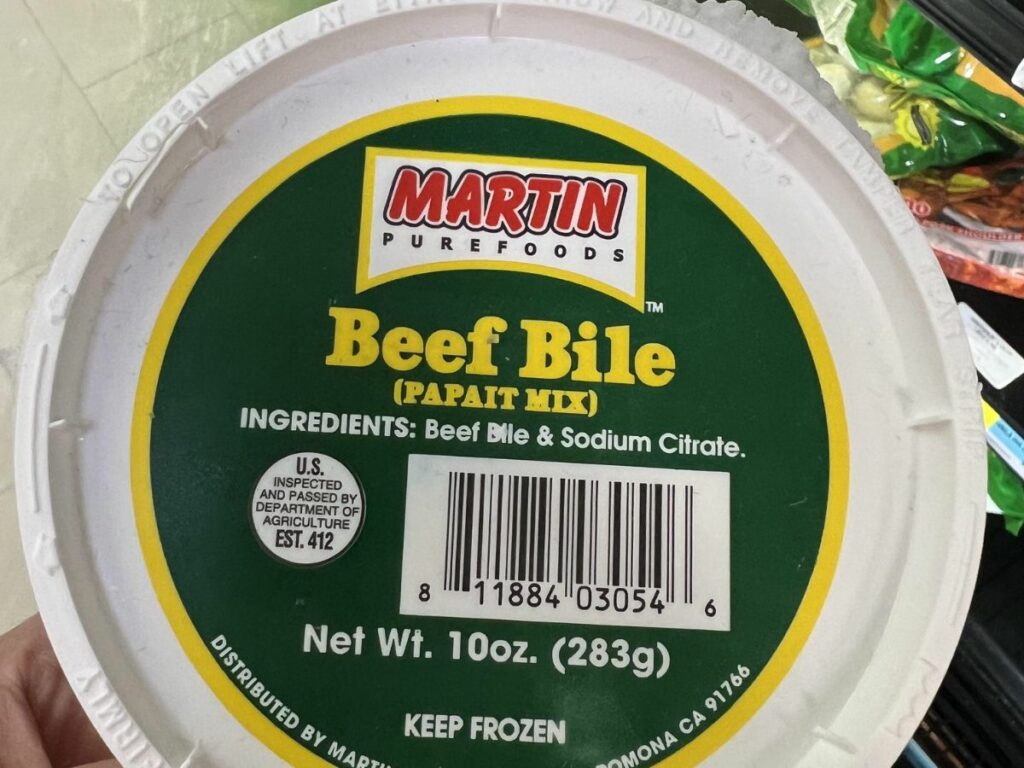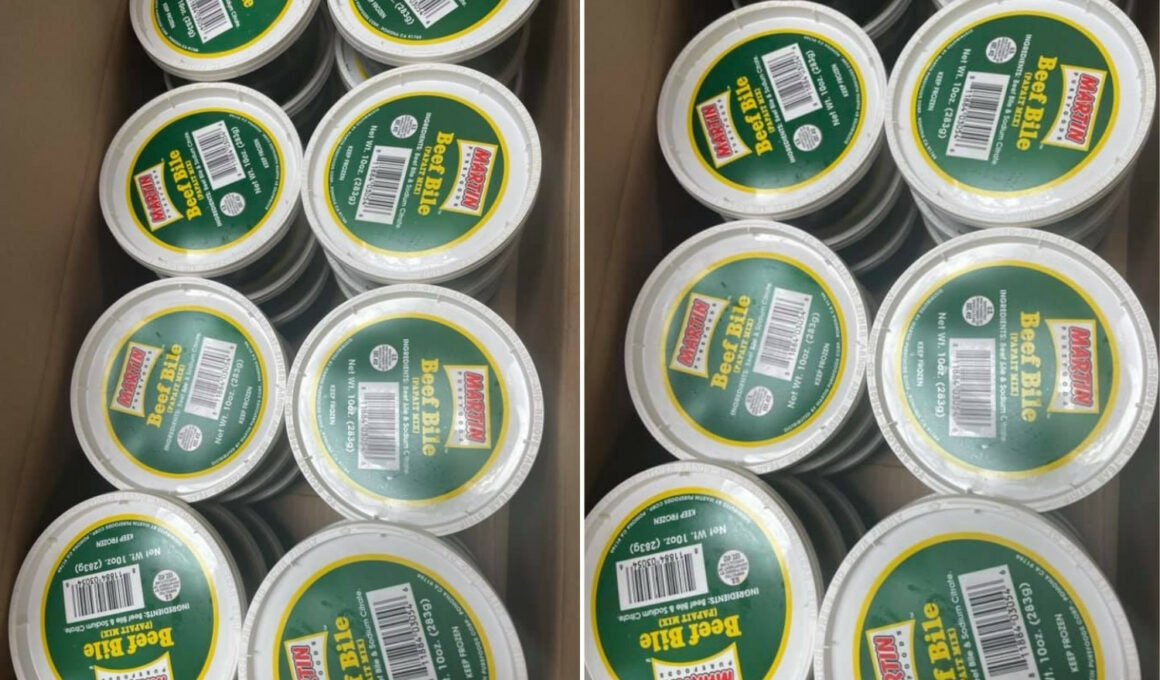In This Article Show
I’m a mom who’s spent countless hours in the kitchen, experimenting with a myriad of ingredients, some familiar and others… well, not so much. One such ingredient that caught my attention recently is beef bile.
Now, before you raise an eyebrow, hear me out. Just like you, I love ensuring that what lands on my family’s table is not only delicious but also nutritious. And in my culinary adventures, I’ve discovered that some of the most unconventional ingredients have a rich history in traditional medicine and offer unique health benefits.
So, let’s take a deep dive into beef bile, learn about its benefits, uses, and answer the big question: Is it safe to eat?
What Is Beef Bile?
Beef bile, in simple terms, is a liquid produced by the liver and stored in the gallbladder of cows. Its primary role? To help digest fats. Just think about when you’re trying to wash greasy dishes – you’d use soap to break down that stubborn grease. Similarly, bile acts like that “soap” in our digestive system, helping to break down fats and make them easier for our body to absorb.
Now, if you’ve ever come across the term ‘ox bile’, you might be wondering if it’s any different. Well, essentially, it’s the same thing. “Ox” is often a term used to describe cattle, regardless of gender. So, whether you see ‘beef bile’ or ‘ox bile’, they’re referring to the same liquid gold from our bovine friends.
And here’s a little fun fact for you; while beef bile is unique in its composition, many animals, including humans, produce their own version of bile. Each type has its nuances, but they all serve the primary purpose of aiding in fat digestion.
Great deals to snatch for your little ones 🎉
So, next time you’re looking at an ingredient list or exploring traditional dishes and come across beef or ox bile, you’ll know exactly what it is and its vital role in digestion.

Benefits Of Beef Bile
Here are some of the benefits of using beef bile in your cooking:
1. Digestive Aid
Beef bile is rich in bile acids, which play a pivotal role in digesting fats. When we consume food, especially those deliciously fatty dishes, our body releases bile to emulsify these fats.
This process essentially breaks down large fat molecules into smaller droplets, making it easier for digestive enzymes to complete the digestion. In essence, beef bile ensures that the fats we eat are efficiently processed and absorbed by our bodies.
2. Supplement for Liver Diseases
Liver health is crucial, and certain conditions might reduce the body’s ability to produce or secrete enough bile. In such cases, beef bile supplements can come to the rescue. They’ve been shown to aid individuals with specific liver conditions by providing the necessary bile acids, thus supporting the overall digestion process and nutrient absorption.
3. Traditional Medicine
Beef bile isn’t just a modern discovery. For centuries, various cultures have revered it for its medicinal properties. It’s been used in traditional remedies to treat ailments ranging from indigestion to certain skin conditions. Its historical significance is a testament to its potential benefits.
4. Nutrient Absorption
Beyond just aiding in fat digestion, bile plays a role in the absorption of fat-soluble vitamins: A, D, E, and K. These vitamins are essential for a host of bodily functions, from maintaining vision to ensuring proper blood clotting. By promoting better fat digestion, beef bile indirectly supports our body in harnessing these vital nutrients.
Popular Uses of Beef Bile
While the idea of consuming beef bile might seem a tad unconventional to some, it’s been a staple in various cultures and applications for years. Here are some of its most popular uses:
1. Dietary Supplements
In the world of health and wellness, beef bile has found its place in capsule and tablet forms. These supplements are often recommended for those looking to improve their digestion, especially if they have difficulties digesting fats. The convenience of a pill allows for easy consumption without the need to integrate bile directly into meals.
2. Traditional Dishes
Culinary enthusiasts might be familiar with certain exotic dishes that feature beef bile as a primary ingredient. In some Asian cultures, bile is used to give soups a distinct flavor and greenish hue. It’s also found in specific stews and broths across different regions, prized for its taste and purported health benefits.
3. Natural Remedies
Beyond the kitchen and the supplement aisle, beef bile has been a component of various home remedies. In some cultures, it’s applied topically to treat minor skin irritations or conditions. Its alkaline nature is believed to neutralize certain skin issues, although it’s always wise to consult with a healthcare professional before trying any new treatment.
4. Leather Tanning
Moving away from ingestion and remedies, beef bile has even found its way into the leather industry. It’s occasionally used in the tanning process to soften and treat animal hides, showcasing its versatility beyond culinary and medicinal applications.
Safety and Side Effects
Before diving headfirst into any new food or supplement, it’s always crucial to understand its safety profile and potential side effects. Let’s shed some light on the safety aspects of beef bile:
General Consumption
For most individuals, consuming beef bile, especially in moderate amounts as found in traditional dishes, is safe. Our bodies are naturally equipped to handle bile, as it’s a substance we produce ourselves. However, like all things, moderation is key.
Potential Risks
While beef bile offers numerous benefits, excessive consumption or supplementation might lead to discomfort. Some reported side effects include stomach upset, diarrhea, or a potential increase in cholesterol levels due to the high content of bile acids. It’s always a good idea to start with smaller quantities and observe how your body reacts.
Drug Interactions
Beef bile supplements might interact with certain medications. This is especially relevant for those taking drugs that affect the liver or gallbladder. If you’re considering beef bile supplements, it’s imperative to consult with a healthcare professional and discuss any medications or supplements you’re currently taking.
Recommendations
Always opt for high-quality beef bile products, whether you’re purchasing it for culinary use or in supplement form. Ensure it’s sourced responsibly and is free from contaminants. And again, moderation is essential. Like any ingredient or supplement, it’s best consumed as part of a balanced diet and not in excessive amounts.
How To Incorporate Beef Bile Into Your Diet
If you’re intrigued by the benefits and uses of beef bile and are considering giving it a try, here are some practical ways to integrate it into your dietary routine:
1. Supplement Selection
If diving into traditional dishes isn’t your cup of tea, beef bile supplements might be an easier gateway. When shopping for them; look for reputable brands that offer third-party testing.
Check the label for any additives or unnecessary fillers. And consider the dosage and, if possible, start with a lower dose to observe how your body responds.
2. Cooking with Beef Bile
For the adventurous foodies out there, why not try incorporating beef bile into some homemade dishes? Start with traditional recipes from cultures that regularly use beef bile. This will give you an authentic taste experience.
Use it sparingly at first. A little can go a long way in terms of flavor and effect. Pair it with ingredients that complement its distinct taste. Remember, it can have a slightly bitter profile, so balancing it with other flavors is key.
3. Storage and Shelf Life
Whether you’re using fresh beef bile or supplements, proper storage is essential. Fresh bile should be stored in the refrigerator and used within a few days to ensure its freshness. For supplements, store them in a cool, dry place away from direct sunlight. Always check the expiration date and any storage recommendations on the label.
4. Gradual Introduction
Like with any new food or supplement, it’s advisable to introduce beef bile gradually. If you’re using it in cooking, perhaps begin by adding it to a dish once a week and monitor how you feel.
For those opting for supplements, start with the recommended dose or even a bit less, gradually increasing if you feel it’s necessary and you’re not experiencing any side effects.
Frequently Asked Questions
Is beef bile the same as ox bile?
Absolutely. The terms “beef bile” and “ox bile” are often used interchangeably. “Ox” is a term that refers to cattle, so whether you come across ‘beef bile’ or ‘ox bile’, they’re essentially referring to bile from cattle.
Can vegetarians or vegans consume beef bile supplements?
No, beef bile supplements are derived from cattle, so they’re not suitable for vegetarians or vegans. If individuals from these groups are seeking digestive aid, it’s advisable to consult with a healthcare or nutrition professional for plant-based alternatives.
Are there any plant-based alternatives to beef bile for aiding digestion?
Yes, there are several plant-based digestive enzymes and supplements that can aid in breaking down fats and improving overall digestion. Examples include lipase (an enzyme that breaks down fats) and herbs like artichoke and dandelion root, which have been traditionally used to support digestion. Again, it’s essential to consult with a professional before incorporating any new supplement into your routine.
If I don’t have a gallbladder, can I take beef bile supplements?
Many people without a gallbladder turn to bile supplements to aid in fat digestion. The gallbladder’s primary function is to store bile and release it during digestion. Without it, bile is directly secreted into the intestines in smaller amounts. Taking a bile supplement might help with the digestion of fats in such cases. However, it’s vital to consult with a doctor before starting any supplementation, especially if you’ve had gallbladder surgery or related health issues.
Wrapping It Up
Beef bile, while not a mainstream topic, boasts a rich history in traditional medicine and culinary practices. From its digestive benefits to its unique uses in various dishes, it offers a blend of health and heritage. Whether you’re considering it for health reasons or pure culinary curiosity, always prioritize safety and informed choices.













